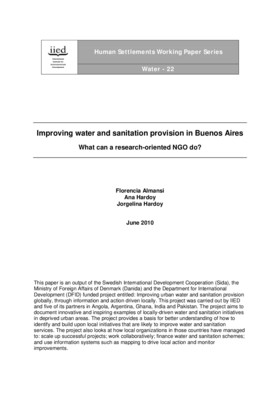Improving water and sanitation provision in Buenos Aires. What can a research oriented NGO do?

Providing water and sanitation services to low-income communities is a key development challenge in urban areas. In Buenos Aires, the delivery of services to these neighbourhoods has historically been undermined by changing combinations of political clientelism, poorly coordinated government programmes, inappropriate and eventually rescinded privatization schemes and a lack participation by local people. In this changing context the Instituto Internacional de Medio Ambiente y Desarrollo’s (IIED-America Latina’s) has been working with communities, local authorities and utilities to secure access to water and sanitation for unserved communities. This experience demonstrates both how important action within local communities can be when public service delivery is inadequate, and how important an understanding of the situation in local communities can be when service providers are attempting to extend their delivery to informal and unserved settlements.
This paper traces the different stages of IIED-AL’s work, explaining the challenges encountered and the strategies used to overcome them. It also examines some key determinants of success: ~• working in collaboration;~• using information as a driver for change;~• finance mechanisms; and~• scaling up.
Cite this publication
Available at https://www.iied.org/10583iied